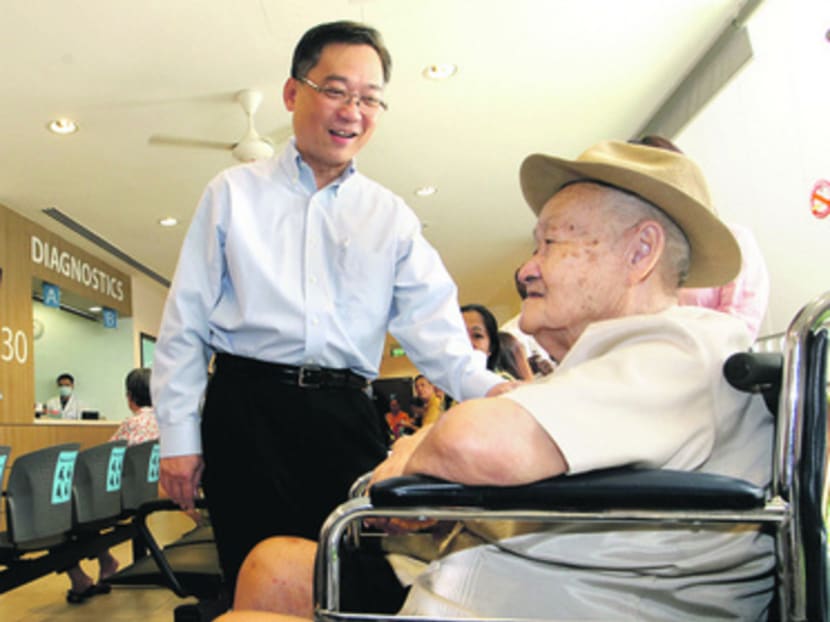Active, healthy seniors an engine for S’pore’s growth: Gan
SINGAPORE — Calling older people an engine for national development who can help the economy flourish, Health Minister Gan Kim Yong yesterday laid out the strategies to prevent Singapore from going down the same path as other countries that have been swept away by a silver tsunami.

Health Minister Gan Kim Yong speaks to an elderly man while on a visit to Toa Payoh Polyclinic on Jun 27 2013. Photo by OOI BOON KEONG.
SINGAPORE — Calling older people an engine for national development who can help the economy flourish, Health Minister Gan Kim Yong yesterday laid out the strategies to prevent Singapore from going down the same path as other countries that have been swept away by a silver tsunami.
To cope with the economic strains of the demographic change, such as a shrinking workforce, a rethink is needed for the workplace, including when one retires, and how to define job roles and arrangements.
On dealing with the social and fiscal impact from a higher demand on healthcare and aged-care provision, the solution is to keep people healthy longer or disperse care to communities as far as possible.
At the core of these strategies, which will determine how Singapore’s fate pans out in the years ahead, is a mindset shift, said Mr Gan, who is also chairman of the Ministerial Committee on Ageing.
“We have a much higher chance of achieving successful ageing if individuals do not associate ageing with mere decline, loss of value, or worse, disability,” he said.
“Likewise, we have a better chance at productive longevity if employers do not have a negative view about seniors, and if the young and society as a whole do not hold a pessimistic and deterministic view of ageing.”
Mr Gan’s comments at the SG50 Scientific Conference on Ageing, which was held at Marina Mandarin Hotel, come after the Government last May changed tack to reframe the ageing population and the challenges that it brings, following observations that the tone of the national discussion on the issue was unnecessarily pessimistic. Some academics, for instance, had argued that the seniors of tomorrow would be healthier, work for longer and have more savings.
Yesterday, Mr Gan said the challenge of a silver tsunami is real, as the tensions and challenges in other countries that have aged show. But Singapore need not let these issues manifest and can still succeed despite a fast ageing population — one in five will be 65 or above in 2030, versus one in nine today.
As life expectancy increases, people can work longer, but must also learn continuously, he said.
“Fifty years ago, when life expectancy was about 70, we may retire in our 50s. But as our life expectancy increases to 85 and further closer to 100, do we still retire at the same age and spend half of our lives in retirement?” he said.
“At the individual level, we need to re-conceive learning, work and retirement — 14 years of formal schooling surely cannot be adequate for an expanding work life.”At the same time, workplaces need to adapt, such as allowing more flexible job roles and work hours, to tweaking the work culture and environment to tap the energies and experience of a workforce of different ages, he said.
But underlying these, efforts are needed to keep individuals healthy until they are older as they live longer, said Mr Gan, adding that his ministry “will place much greater emphasis on preventive health”.
Although the Government has expanded the capacity of acute and community hospitals, he said the centre of gravity of the healthcare system will have to increasingly shift to primary care and home and community aged care to support ageing in place. He also cited how all six regional health systems have stepped up efforts on promoting health and integrating care, such as Alexandra Health Services’ provision of screening for about 6,500 residents in the north and north-west regions.
Lastly, urban planning also has to evolve to make Singapore a city for all ages, said Mr Gan.
This includes making the transport system more senior-friendly and minimising fall risks in the environment, as well as providing more assisted living services within towns and roping in the community to look out for their older neighbours.






